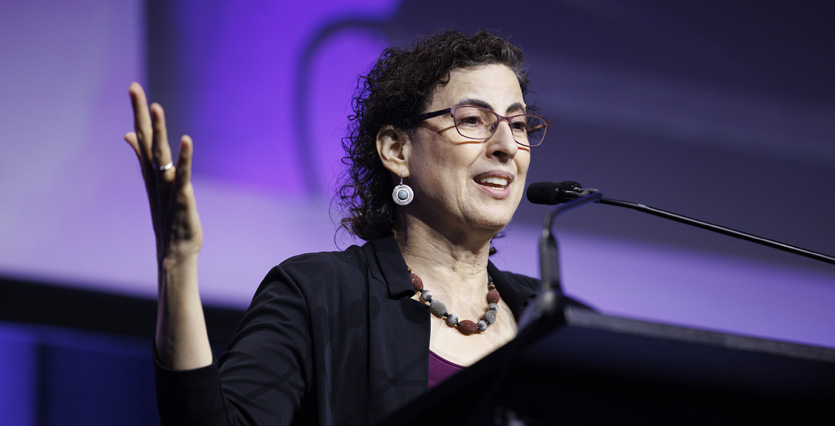


Iris Gibbs, MD, FASTRO, Stanford Medicine, introduced Danielle Ofri, MD, PhD. Dr. Gibbs shared Dr. Ofri’s numerous roles including that as primary care internist at NYU Grossman School of Medicine and Bellevue Hospital, the oldest public hospital in the U.S. Dr. Ofri wears many more hats, including as Editor-in-Chief of the Bellevue Literary Review. She is the author of numerous books including, “When We Do Harm: A Doctor Confronts Medical Error” and “What Doctors Feel: How Emotions Affect the Practice of Medicine.” The winner of multiple prestigious awards, including the Guggenheim Fellowship, she has become known both for her powerful narrative storytelling and insightful reporting. In her keynote, Dr. Ofri offered insights into how we can reengage and thrive in an increasingly complex medical landscape.
Unintentionally, Dr. Ofri set the right mood to prepare for this talk, upon recognizing that she had not blocked off October 1 on her calendar for attendance at ASTRO. As a result, she had to deal with the consequent scramble to notify staff and a slew of patients ready to show up at clinic. Another example that typified the stress felt regularly was that of a patient who showed up to Dr. Ofri’s office, afflicted with multiple health issues, numerous medications in her tote along with an enormous stack of medical forms. Fifteen minutes quickly morphed into 45 and the scenario became more complex with an IT helpdesk on the phone line and the queue of patients growing. Emotions simmered over, leading to one dominant sentiment: I QUIT.
This encounter reflects the growing reality of medical practice today. Disillusionment has a variety of effects: some turn inward and withdraw, others turn on their staff, and other spillover effects include substance abuse, anxiety and job dissatisfaction. Grumbling becomes the baseline to daily life.
Citing the higher rate of suicide in the medical profession compared to others, Dr. Ofri furthermore summarized the oppressive feelings of self-doubt that typify medicine, where doctors are plagued with a tyranny of self-perfection. Demands are contradictory, i.e., document meticulously but do not keep patients waiting. The medical system places clinicians in impossible situations, and these small bits of disrespect have become the norm thanks to the creep of inertia. Some of the most potent points of stress happen at the nexus of work life and family life, where competing demands leave us in positions where we can do nothing well. Unsurprisingly, a growing body of evidence reveals that burned out, emotionally fatigued doctors commit more medical errors.
Conversely, medicine can offer so much satisfaction in the opportunities available to help others. One study by the RAND Corporation followed 20,000 patients and their doctors, tracking not what the doctors did but how they felt. Patients’ blood pressure was also tracked. Doctors who felt better had patients with better clinical outcomes.
Dr. Ofri shared her experience in learning the cello. She plunged herself into an avid learning environment, where the concentrated learning and exponential increase in knowledge led to a duality of being totally exhausted and exhilarated. Medical orchestras are not uncommon, and Dr. Ofri mused on the possible connection between musicianship and medicine. When practicing, she has found herself focusing even more narrowly, progressing from a single page, line, measure, to note, with the objective of achieving precisely the right note. Taking it one step further, there’s another goal: not settling upon the note being merely right, but beautiful.
Like learning a piece, starting out in one’s career, there is a sense of engaging in the onerous climb for the betterment of self and patients. But as the betterment curve threatens to flatten out, continued learning can be useful to addressing disillusionment. The concept of beauty doesn’t receive a lot of airtime in medicine. But medicine is about life, and living never ceases to be miraculous. Our privilege is to be part of the beauty itself.
The medical system has placed its members in untenable positions to keep our enterprise afloat. Dr. Ofri suggested that greater awareness among other parties in the system, such as administrators, could be cultivated by inviting them to share a day with us.
Clearly, Dr. Ofri said, we need a seat at the table. COVID showed us how quickly clinicians could innovate. “They let the inmates run the asylum, and we figured it out.” We need to attune to each other’s suffering. We shouldn’t be afraid to speak up on what is wrong or right about medicine.
Dr. Ofri described the moment she shuts the exam door, she leaves the bureaucracy outside, that it is just the patient and her. Therein lies the opportunity to try to solve her patient’s problems, helping cure a disease, lightening a burden by listening to a patient’s story. She described a medical student she mentored, her eyes ablaze with fervor, excited at the chance to figure out whether a patient’s condition was life threatening and the joy of telling them their diagnosis was manageable and observing the consequent relief.
During COVID, Dr. Ofri said doctors had the privilege of education, of being able to step into the vortex with patients. And even as those years were saturated with grief and pain, physicians had the good fortune of purpose. Young people sense this, as the number of applications to medical school soared between 2010-2020, with over 60,000 students applying for 23,000 spots. The hope of experiencing the beauty of making one person feel better is contagious.